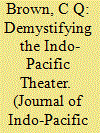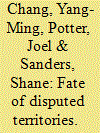| Srl | Item |
| 1 |
ID:
172655


|
|
|
|
|
| Summary/Abstract |
Within the Indo-Pacific reside a number of dynamic and complex regional challenges with worldwide implications, including nuclear powers, disputed territories, ballistic missiles, and highly adaptive adversaries. Countering each of these challenges requires a whole-of-government approach in which the other three instruments of power understand that the military maintains a necessary level of readiness to backstop their combined efforts. Revisiting, in detail, the four NDS challenges in the Indo-Pacific validates this construct.
|
|
|
|
|
|
|
|
|
|
|
|
|
|
|
|
| 2 |
ID:
079649


|
|
|
|
|
| Publication |
2007.
|
| Summary/Abstract |
This paper presents a simple model to characterize the outcome of a land dispute between two rival parties using a Stackelberg game. Unlike Gershenson and Grossman (2000), we assume that the opposing parties have access to different technologies for challenging and defending in conflict. We derive the conditions under which territorial conflict between the two parties is less likely to persist indefinitely. Allowing for an exogenous destruction term as in Garfinkel and Skaperdas (2000), we show that, when the nature of conflict becomes more destructive, the likelihood of a peaceful outcome, in which the territory's initial possessor deters the challenging party, increases if the initial possessor holds more intrinsic value for the disputed land. Following Siqueira (2003), our model has policy implications for peace through third-party intervention
|
|
|
|
|
|
|
|
|
|
|
|
|
|
|
|
| 3 |
ID:
167684


|
|
|
|
|
| Summary/Abstract |
Less than a month after the Kurdistan independence referendum, the Iraqi Army and units of the Popular Mobilisation Forces (PMF) attacked the disputed province of Kirkuk on October, 16, 2017. Unlike most national defence forces, the Kurdish Peshmerga is divided along partisan lines between the two largest parties in Iraqi Kurdistan. This particular area was largely under the control of units affiliated with the Patriotic Union of Kurdistan (PUK), which decided to make a strategic withdrawal in the face of superior numbers and firepower. The city was then retaken in short order by forces loyal to Baghdad, as were all other disputed territories previously under Kurdish control. Subsequently, the allegation that the PUK had retreated too easily has been described by the rival Kurdistan Democratic Party (KDP) and others as a betrayal of the Kurdish people by the PUK. This has created two competing post-event perspectives: first, that the Peshmerga forces should have defended Kirkuk to the last man and should not have left their front line trenches; second that the withdrawal of the Peshmerga was a deliberate and rational military reaction to overwhelming opposition. This article critically assesses both perspectives and finds that partisan divisions in the Peshmerga critically undermined the ability of Kurdish forces to defend the disputed areas that they controlled. Instead of serving as motivation of create a unified fighting force, the loss of Kirkuk has only served to deepen those divisions.
|
|
|
|
|
|
|
|
|
|
|
|
|
|
|
|